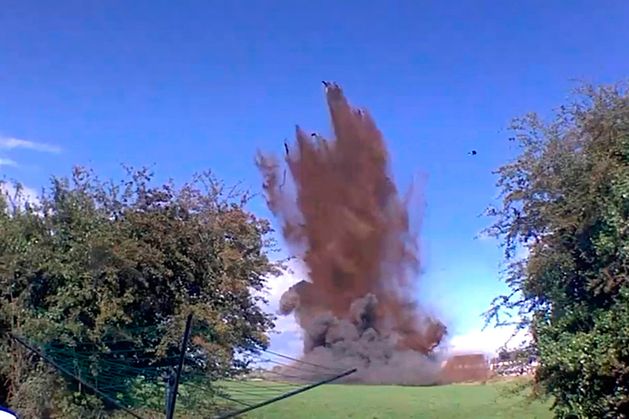Residents return to their homes after experts successfully deal with 83-year-old device
Minimal damage was caused to nearby properties in the Rivenwood area of Newtownards when the explosion occurred yesterday.
Black smoke could be seen billowing from the scene at 3.38pm on Monday as experts successfully completed what police described as a “highly complex operation”.
PSNI Superintendent Johnston McDowell thanked those affected by the operation as he confirmed residents could return home yesterday evening.
He also praised the Army’s 321 EOD and search squadron as he confirmed the munition was an air-dropped SC-500 German bomb believed to be around 83-years-old.
“But [it] still posed a significant risk to public safety, even after all this time,” he added.
The Ards and North Down District Commander had previously warned residents who refused to evacuate their homes that there was a “risk of death or serious injury”. Occupants of over 400 homes within a 400m exclusion zone were forced to flee the area on Saturday.
Army and police deal with bomb which was discovered on a building site in the Rivenwood housing development area of Newtownards, Co. Down. Pic: Presseye
James Fraser, the developer of the site, said there are no reports of broken windows but solar panels have been damaged on some properties. But residents may have to shell out for the repairs from their own pockets.
Joan McCabe (63) has spent days worrying about the new house she is due to move into next month — it is situated right beside where the 1,100lb bomb was found.
The Rivenwood resident is now waiting to find out the extent of the impact of the controlled blast. “I know there is damage to solar panels and roof tiles, but I’m still not allowed in to see it,” she said. “I’m not sure about structural damage and will need to wait for it to be assessed. But at least it’s still standing.”
Litigation expert William McSorley said house insurance policy providers often include a “war exclusion” clause which can affect coverage. The partner at Millar McCall Wylie Solicitors referred to the notable case of Allianz Insurance plc v University of Exeter, when “the court ruled that damage from a controlled explosion of a WWII bomb was not covered” due to the clause.
“The war exclusion clause typically excludes coverage for damage “occasioned by war,” which includes unexploded bombs from WWII,” Mr McSorley told the Belfast Telegraph.
“Therefore the resulting damage in Newtownards may not be covered by standard home insurance policies.
“It’s always best to review your specific policy details or consult with your insurance provider to understand the exact coverage and any exclusions that may apply.”
Mr McSorley encouraged affected homeowners to consider seeking legal advice after they have exhausted efforts through the insurance route. “The Ministry of Defence will have to show that they have taken the appropriate safety precautions to minimise the damage caused.”
Footage of a huge explosion as army deals with WW2 bomb in Newtownards
Prior to police confirming that the device was to be “dealt with on site”, efforts were underway to rescue abandoned pets. Lost and Found Pets Ards & North Down had been contacted by a distraught resident who was forced to leave their beloved rabbit behind at the weekend.
Andrea Mammus, from the group, said the woman was understandably denied access when she tried to return to the property and that talks had been underway with police to help get the animal into the care of someone who had volunteered to look after it.
“We have now had over 800 offers from people willing to foster animals,” she told this newspaper. “We were trying to get to this rabbit and were aware of a cat that was left behind.
“We had carers arranged for both. Anyone who asked us for help, we have been able to help.”
Ms Mammus said all animals will be returned to their owners as soon as they are told the area is safe for them to return to.
The controlled explosion was carried out following lengthy discussions with ATO specialists about whether the bomb should be removed instead.
The operation was expected to take more than five days to complete but “great progress” on the mitigation stage meant the situation developed faster than anticipated.

